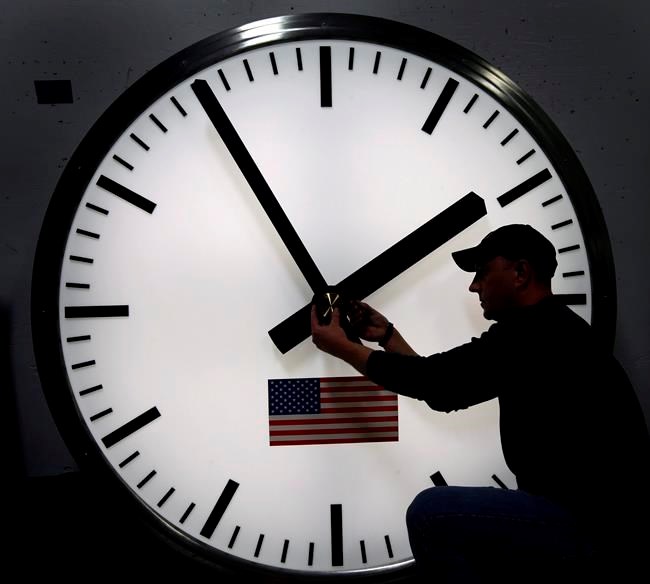Most Canadians have the chance to catch up on some sleep when clocks move back an hour Sunday, but an Ontario politician is optimistic it could be the last time for the country’s most populous province.
Jeremy Roberts, who represents the constituency of Ottawa West-Nepean, tabled a private member's bill in October 2020 that would end the biannual time change in Ontario.
The bill, which passed the next month with unanimous support, would have the province on permanent daylight time. Ontarians would get an extra hour of daylight at the end of the day in exchange for it in the morning.
“I have always really disliked the time change, particularly the fall-back time change,” Roberts said.
“I find it’s just awful when you get home from work in the afternoon and it’s already dark out and you feel you can’t go out.”
Before introducing the bill, Roberts consulted with people who he said favoured extra daylight in the evening.
But he said Ontario must wait for its two biggest neighbours to be on board before making the change.
“When it comes to New York state, we have a lot of cross-border trade, but on top of that we also benefit from being in the same time zone as the markets in New York City, so we didn’t want to do anything to disrupt that.”
Roberts said he reached out to Quebec Premier François Legault and New York Gov. Kathy Hochul.
Legault has indicated to him, as well as publicly, that Quebec supports the idea of sticking with daylight time, Roberts said.
He hasn’t heard back from Hochul, but there is a bill before the state legislature proposing year-round daylight time. Complicating matters in that even if the state opted for that, it would still have to wait for Congress to approve it.
British Columbia has already decided to stick with daylight time but is waiting on states to the south to do the same. Yukon decided last year to no longer make seasonal changes and now follows its own standard time zone. Saskatchewan doesn't change its clocks.
Last month, Albertans voting in a referendum narrowly rejected a switch to permanent daylight time. Psychologists with expertise in circadian rhythms had warned that the switch would mean some areas of Alberta wouldn't see the sun rise in the winter until about 10 a.m.
Studies around the world have linked time changes to increases in car crashes, depression, lower productivity and a higher risk for heart attacks and strokes.
That's particularly the case in the spring when clocks move forward and an hour of sleep is lost, said Joseph De Koninck from the University of Ottawa’s Brain and Mind Research Institute.
De Koninck agrees that changing the clocks should stop, but suggests that sticking to daylight time year-round is the worst option.
Standard time is the best choice for the general population's health because it is more in line with solar time and people's body clocks, said the sleep expert.
He said if Ontario moves to permanent daylight time, cities such as Ottawa wouldn't see dawn break until about 8:45 a.m. in December and January.
"A lot of people would be going to work in the dark, which is the worst thing that could happen to your biological clock, because you need the exposure to daylight in the morning to start your internal clock."
De Koninck said having more light later in the day could have economic benefits as it could boost consumerism after work. But it would also increase mood disorders, weaken immune systems and increase the risk for certain cancers, he said.
He pointed to Russia, a country as far north as Canada, which moved to permanent daylight time in 2011, only to abandon it three years later. Studies showed it particularly affected children and their academic performance, De Koninck said.
It doesn’t make sense for provinces to align themselves with U.S. states that are farther south and generally have more hours of winter light, he added.
"The politicians and the business people who want to have the light late in the day for different activities, such as golf … but people are not informed on what that will mean for them in December."
This report by The Canadian Press was first published Nov. 6, 2021
Daniela Germano, The Canadian Press




